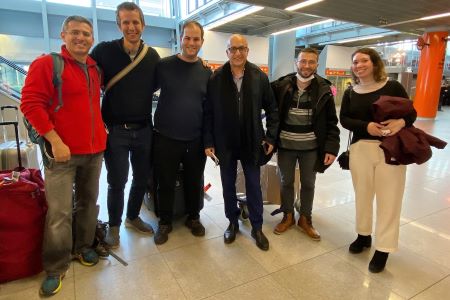
The work of the Hadassah Medical Organization team providing medical care to Ukrainian refugees as they arrive at the refugee center in the city of Przemyśl, Poland, has been bolstered by a new contingent of doctors and nurses specializing in internal medicine and pediatrics. The new arrivals from the Hadassah hospitals in Jerusalem have brought 170 kilos of medications with them. The Hadassah team will now be able to offer long-term care in this area and have also taken responsibility for training local staff.

Przemyśl is one of the largest border crossings with the Ukraine, and thousands of refugees arrive by train every day. In coordination with NATAN Worldwide Disaster Relief, the World Health Organization, Polish health authorities, and the Polish Red Cross, the Hadassah team has medical responsibility for refugees at the border crossing close to Przemyśl. Thousands of refugees are in that area, recovering from their ordeal and awaiting dispersion to eastern Poland and across Europe.
Team member and deputy head of Hadassah’s Orthopedic Department Dr. Shaul Beit explains: “The delegation was set two main tasks by Acting HMO Director-General Prof. Yoram Weiss: Assisting medical staff in Poland to prepare for the arrival of large numbers of casualties from the fighting in Ukraine and providing medical assistance to refugees at border crossings.”
“We made immediate contact with the university hospital in Lublin – a regional trauma center, charged by the Polish government with heading treatment of refugees and the injured, and provided them the opportunity to benefit from Hadassah’s experience in dealing with mass-casualty and serious trauma incidents.”

Hadassah’s training program at the Lublin hospital was led by Dr. Asaf Kedar, a senior surgeon, who heads the trauma unit at Hadassah Mount Scopus. Among those attending the sessions were the hospital’s director and department heads. Together with the Lublin team, the Hadassah delegation created a communication network with smaller hospitals in the region. This is to enable real-time guidance. At the request of the local medical centers, Hadassah produced a training video. As a result of the Hadassah training, the Lublin hospital is adjusting its preparations. Hadassah trauma experts have also led training sessions for all the hospital’s medical staff.
“We also went to the border with Ukraine and witnessed the influx of refugees – women of all ages and children in particular – exhausted and frozen after the long and difficult process of crossing the border,” says Beit. Hadassah Ein Kerem internal medicine expert Dr. Ye’arit Rebak is now coordinating medical treatment in the Przemyśl area.
The Hadassah delegation includes medical staff from the Hadassah hospitals who are providing their expertise, and representatives from Hadassah International who are responsible for coordinating the mission on the ground in Poland. It is supported by Hadassah, The Women’s Zionist Organization of America, Inc. (HWZOA), the Hadassah Medical Organization (HMO) board of directors, and Hadassah International (HI).
HWZOA and HI are both supporting the initiative with fundraising campaigns around the world.
 Prof. Yoram Weiss: “Hadassah’s vision and values-led us to this practical action which goes far beyond the sympathy and compassion we feel for the refugees who in a moment left the lives they knew and came to the borders wounded, sick and grieving. We chose to provide any help that is needed. I’m proud of the many staff members who volunteered for this mission. A Zionist organization such as Hadassah, that treats refugees on Polish soil, is the living embodiment of the Israeli spirit of giving and humanitarianism in the most important of times.”
Prof. Yoram Weiss: “Hadassah’s vision and values-led us to this practical action which goes far beyond the sympathy and compassion we feel for the refugees who in a moment left the lives they knew and came to the borders wounded, sick and grieving. We chose to provide any help that is needed. I’m proud of the many staff members who volunteered for this mission. A Zionist organization such as Hadassah, that treats refugees on Polish soil, is the living embodiment of the Israeli spirit of giving and humanitarianism in the most important of times.”
HI Executive Director Jorge Diener: “From the moment the fighting started in Ukraine, we understood a humanitarian catastrophe was unfolding and only worsening with time. It’s hell for the refugees, with destroyed lives that must be built anew. Hadassah’s ethos is to bring medicine to Israel and every corner of the globe. Therefore, right now we are in eastern Poland and on the Ukrainian border and here we shall stay.
